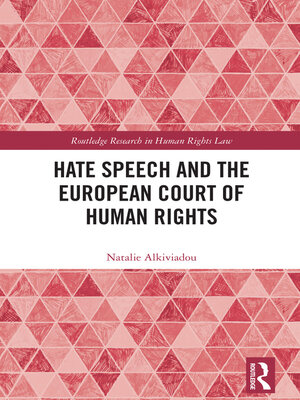Hate Speech and the European Court of Human Rights
ebook ∣ Routledge Research in Human Rights Law
By Natalie Alkiviadou

Sign up to save your library
With an OverDrive account, you can save your favorite libraries for at-a-glance information about availability. Find out more about OverDrive accounts.
Find this title in Libby, the library reading app by OverDrive.



Search for a digital library with this title
Title found at these libraries:
| Library Name | Distance |
|---|---|
| Loading... |
This book argues that the European Court of Human Rights (ECtHR) should reconsider its approach to hate speech cases and develop a robust protection of freedom of expression as set out in the benchmark case of Handyside v the United Kingdom. In that case, the ECtHR determined that Article 10 of the European Convention on Human Rights (ECHR), safeguarding the right to freedom of expression, extends protection not only to opinions which are well received but also to those deemed offensive, shocking, or disturbing. However, subsequent rulings by the Court have generated a significant amount of contradictory case law. Against this backdrop, this book provides an analysis of hate speech case law before the ECtHR and the now-obsolete European Commission on Human Rights. Through a jurisprudential analysis, it is argued that these institutions have adopted an overly restrictive approach to hate speech, which fails to provide adequate protection of the right to freedom of expression. It also demonstrates that there are stark inconsistencies when it comes to the treatment of some forms of 'hate speech' versus others. The study further contends that, in reaching its decisions on hate speech cases, the Court disregards empirical evidence on matters related to free speech restrictions. Viewing the ECHR as a 'living instrument,' the book places this analysis within the current state of affairs vis-à-vis the handling of hate speech, particularly online, by European countries, the European Union itself and social media platforms, actions which the author argues are contributing to a free speech demise. The book will be a valuable resource for academics, researchers and policymakers working in the area of law, political science, European studies and sociology.







